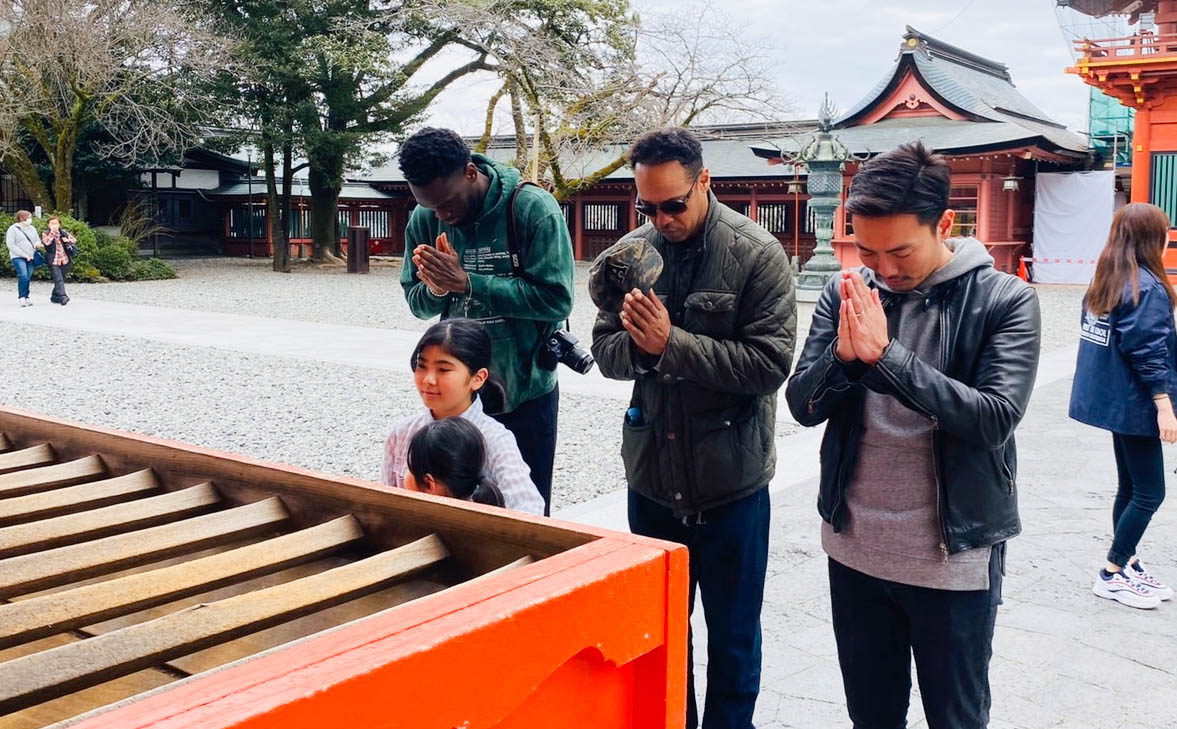
Outside Shots: From Japan to the NBA, Coronavirus Shuts Down Basketball
Nearly two months have passed since the NBA suspended the 2019-20 season due to the coronavirus outbreak. But in sports-crazed countries around the world, including Japan, basketball has been on hold for much longer than that. To better understand the view of the hoops hiatus from abroad, CloseUp360 caught up with Mike Ojo, a veteran of the global basketball scene, occasional contributor to our “Outside Shots” series and cousin to Utah Jazz rookie Miye Oni.
The following is Mike’s account of the pandemic and his relationship with Miye, edited for clarity and length.
When the NBA announced it was shutting down its season amid the coronavirus outbreak, I was (and still am) in Japan. The first game they stopped was the Utah Jazz vs. the Oklahoma City Thunder. My cousin, Miye Oni, is a member of the Jazz. He's bounced between their G League team and senior roster. He just happened to be at the game where everything shut down. That woke up America to the severity of this virus and the oncoming pandemic.
As you can imagine, I've now become an avid fan of the Jazz, which is crazy. Being a Michael Jordan-era fan from LA, the Jazz aren't a team that I would follow. But since Miye joined the team, I've been all about them. I've been very aware of when he's been called up, when he's been sent down, how he's been playing in the G League and if he would be getting minutes with the senior team.
At the time that game was canceled, Miye and I hadn't spoken in a little over a week. But I went and checked the active roster for the game that day, and his name was on there. At that point, I kind of freaked out.
Shit, my cousin is now at the epicenter of this game that shut down the sporting world.
As soon as I saw that, I hit him up to make sure he was alright. He gave me the green light as to his own personal health. That was a major relief, but it was crazy that, just by fate's chance, he would be at the first game the league stopped from being played because of this.
My cousin and I hadn't talked about the virus shutting down anything in the States. I don't want to say we were ignorant to the potential of it, but we just weren't worried about it. There have been all types of other potential pandemics that have broken out over the years that never managed to wreak havoc in the States, so we weren't really thinking about that.
Prior to coming to Japan, I had a few conversations with Pooh Jeter about the CBA and how they shut down, because he's synonymous with Chinese basketball. He's a walking legend. Seeing him pop back in Los Angeles in January is just, like, Okay what's going on? We were joking around, like, Yeah, we've got to quarantine you before you can come and play pickup.
As a whole, we weren't thinking about this becoming a full-blown pandemic like it has been.
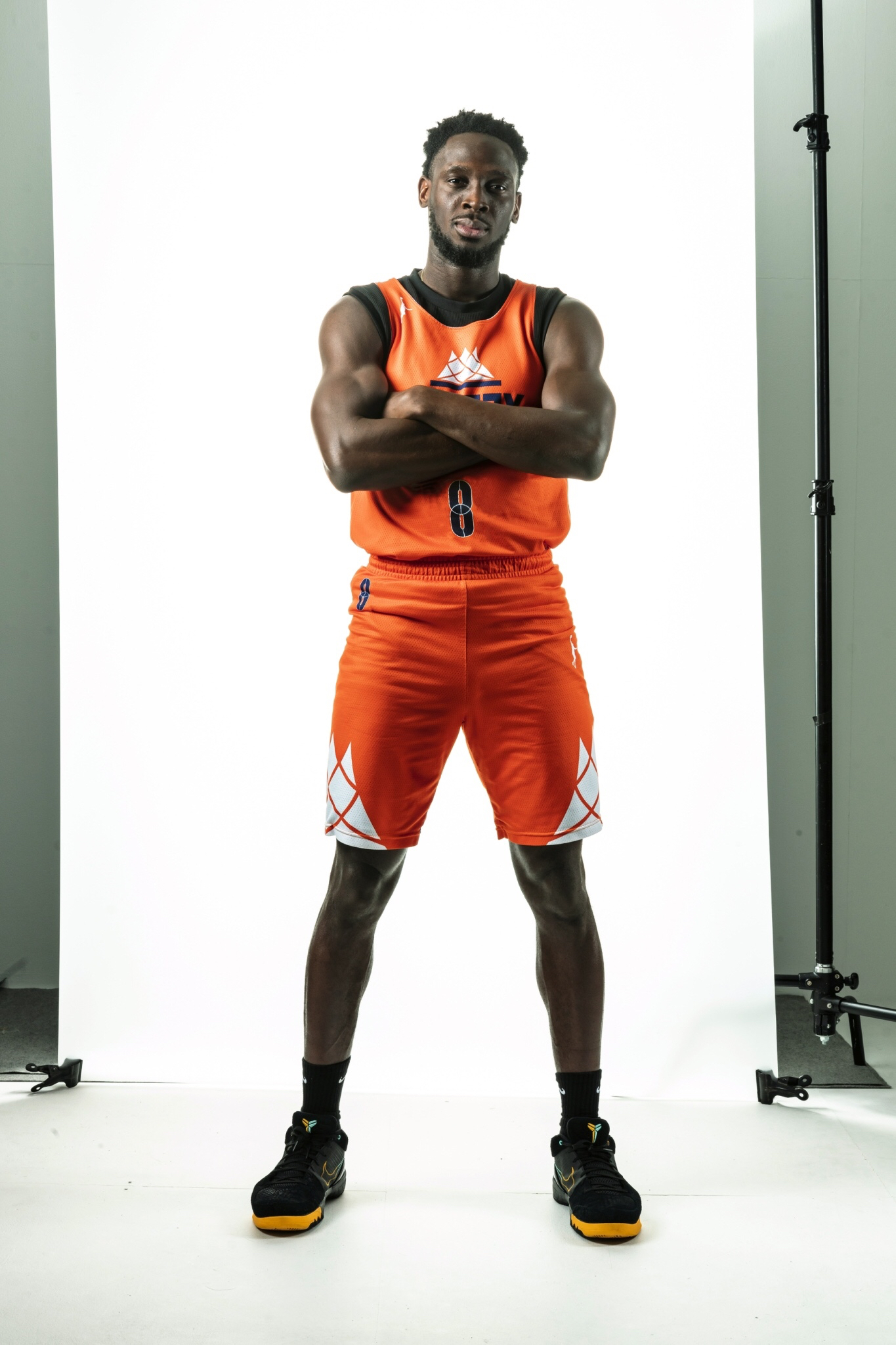
Mike Ojo was in Japan when his cousin, Miye Oni, was in Oklahoma City, at the site of the NBA's coronavirus shutdown. (Courtesy of Mike Ojo)
Family-wise, Miye and I were always cool, but not always close. Everything fell into place as it was supposed to because he's really talented.
He played on an AAU team called BTI that was coached by one of my friends, Flynn Clayman. Miye just blew up. It was really great to see because I'm fully aware of how much work and effort he put into becoming the player that he is, and that he's still putting in to become the player that he will be.
We really started to become closer when Miye was in high school at Viewpoint School in Calabasas. The way I approach things with basketball is, knowing just how serious of a commitment it is to actually become good at it, I didn't want to force anything upon anybody. With eight years between us, I didn't want to be this overarching presence. He completely fell in love with the game on his own. And as he was coming into his own as a high school player, that's when things really sparked off between us.
I remember, I had come back from the Czech Republic in the spring of 2016, during Miye’s breakout season. At the time, he was still committed to a Division III school, Williams College. I ended up rolling with Miye’s parents to one of their games at the Campbell Hall School in Studio City, where the Holiday brothers—Jrue, Justin and Aaron—had played. Within 45 seconds of seeing Miye play and actually get up and down the floor, I was, like, "There's no way your son should be going to a Division III school. There's just no way. I know that the educational aspect of things is extremely important to you, but I believe your son can get those opportunities at a higher level."
At that point, I went full in on trying to make sure that Miye was able to maximize his opportunity with basketball and, honestly, his blessings. He's an incredibly gifted athlete, scorer and playmaker. He's a very talented kid. You can see it.
Our relationship developed through the game. At the time, as a young kid, sometimes you just need to hear from someone that certain things are possible for you to really believe in it, to start to fully believe in yourself and what you could do. I don't wanna say I was the first person to say that was possible for him, but I know I instantly saw it. And the kind of person I am, I'm not here to block anybody's blessing by any means, so I let him know.
Bro, I think you really have a shot and I think you really should re-evaluate again where you're gonna go to school, take a post-grad year if you can and just go all the way in.
I felt like he hadn't come into his own yet in high school. Prior to his senior year, he wasn't really playing like that. Then that senior season came about and he burst onto the scene. Being around the game, being around people and being a late bloomer myself, to a certain extent, I knew how much a post-grad year would have benefitted me, had I had the opportunity to take it.
Seeing his talent and where he was going and where he could potentially be, there was no doubt in my mind that I had to communicate this to Miye’s family. I felt like you could see his talent from a mile away. Sometimes, it takes a little bit longer for it to develop, and I think the year he took at Suffield Academy in Connecticut really helped him.
From the time I first saw Miye play in high school, we started talking a lot more about basketball. I started giving him a lot of the knowledge that I had accumulated over the years. We got a few workouts in, and he continued to get better and better.
There was a pickup run he came to at Memorial Park in Santa Monica, and he just blew guys out of the water with his skill and athleticism. Miye definitely made his presence known.
They're, like, “Who's this kid? Where's he from?”
I'm, like, “That's my cousin and he's fuckin' next!”
There was another time I was putting him through a workout. We were just working on some finishing. I had him driving baseline to do a semi-contested finish, and this dude took off from outside the right box, reverse dunked it on the other side of the rim and landed on the left box. I just looked at him, like, Shit, bro, that's what you're on. It was crazy to see the development happen before my eyes.
Once Miye got to Yale, it was fun following him while I was playing all over Europe. I'd have a lot of late nights staying up to watch their games, trying to keep up with his stats and just tracking his progress.
Miye burst on to the scene. His first game as a freshman—at the University of Washington, against Markelle Fultz and Matisse Thybulle—he went off, and I wasn't surprised. Miye went right at them and wasn't shy about anything. He had 24 points in his first game as a college player against the soon-to-be No. 1 pick and another future first-round pick. Yale ended up beating Washington, 98-90. That first game set the tone for things.
Seeing that, I was just proud because I knew the kind of work that he had put in to get his game to that point, and I was really happy that he got to display it on that stage. Ultimately, as basketball players, we work out, we grind, we do everything we do, so when the lights are on, we can perform and shine.
On the court and off the court, Miye is two completely different people—as it should be. On the court, he's a vicious competitor, which is what's needed to survive at the professional level. Off the court, he's a fun-loving, goofy individual. He's cool. He's super fun to be around, very respectful and extremely humble. He's got all the pieces to be a successful player and a successful person.
When Miye was in college, we talked every two or three weeks. He was busy with college basketball, and I was still playing overseas.
I don't like to be all up under guys, but whenever Miye would have a good game, I'd shoot him a text congratulating him. If I saw things that he could work on or improve upon, I'd point them out to him. I'm not the overbearing kind of person. I would get my advice in every now and then, and we'd just talk generally, as well.
I was mad at him for not testing the NBA draft waters earlier, to be completely honest, just because I feel like after his freshman year, there was a tremendous amount of hype surrounding him. I don't even want to say it was hype because, to me, it was more substance. He could play. He went to the Nike Skills Academy in August 2017 and did some damage in that. He knew at that point, like, Okay, I'm capable of doing this.
When he declared for the draft in 2019, we had talked about it. I was all for it. I know from a family standpoint, education comes first, but I was telling him, “You can't pass up on opportunities like this because, at the end of the day, you can always continue your studies while you're a professional, be it during the year with online classes or during the summers. But as far as getting an opportunity to have your name called and to be one of the best 450 players on the planet? You can't pass on those opportunities.”
The night of the 2019 draft, I was at home with my mom. Usually, I don't watch into the second round, but for obvious reasons, I was invested. I started to sweat a little bit. It was getting late and there were certain teams that we had talked about that Miye felt like he worked out well for, that went in different directions.
When his name was called with the 58th pick, I just...I just lost it. Knowing how much time and effort he put in to develop, and then knowing it was his dream and he was having the opportunity to fulfill it...man, it was a beautiful moment. Even to this day, I'm so happy for him.
I kind of went through that with C.J. McCollum, just because he was my teammate for two years at Lehigh. Seeing him grow into the player that he's become with the Portland Trail Blazers, it’s not a surprise because he's been about nothing but the hard work, year in and year out. But to see him get drafted and walk across that stage, just to see people fulfill their dreams like that...man, there's nothing better than that.
It’s been so dope to see Miye’s progression as a pro. In summer league last year, he had some bumps and bruises. Same with the G League. But everything is just about personal growth. I feel like he's continued to grow as a player.
This past summer, we got in the gym together, and you could see the growth that he made, year after year after year. He's a hard worker, and hard workers improve, just by nature of putting themselves in positions to do so. He's had some crazy highlight plays in the G League. He's had some really good games. He's honestly more of a point guard than anything else. And 6'6" point guards aren't walking through the planet every day. I feel like he's shown that he is a professional, and he deserves to be at that level.
Out here in Japan, I wanna say we were shocked when the NBA postponed its season, but we weren't at the same time. With the NBA shutting down, it set the tone for every basketball league in the world because clearly, the NBA is the top of the top.
The coach on my team now—Veltex Shizuoka, in the third division of the Japanese B.League—is Rasheed Hazzard. He's an ex-NBA coach. He most recently was an assistant with the New York Knicks under Derek Fisher. Prior to that, he was with the Lakers under Phil Jackson. When he heard the NBA was shutting down, we were all just shocked and concerned about the potential spread of the virus among players and then from players to fans, and then from fans to the whole country. It was very shocking news.
A lot of people were worried about me coming to Japan. They were saying, “Be careful. Are you sure you want to be going out to that region right now?” I felt confident in the way the Japanese government seemed to be handling the situation, so it was almost a no-brainer for me to take advantage of the opportunity.
This all came about in late January. I was dead set on getting back to Italy. I had a wonderful experience there. It's an amazing, beautiful country. Obviously, it's super tragic, everything that they're going through right now, but I was gung-ho on it.
One of the teams that was interested in me was Bergamo Basket 2014. They're very close to, if not in, the epicenter of this outbreak. That, honestly, was a bit of a blessing in disguise for me. But it's such a tragedy that Italy is being affected in the way that it is. Honestly, Italy, Spain, all of Europe at this point, and going forward, that's gonna completely change the landscape of basketball overseas.
My mentor, Rasheed, ended up getting the coaching job out here in Shizuoka. They needed to make a player change and he wanted to bring me in. I felt like I'd be a fool to not take advantage of the opportunity to play for my mentor, and also to get a foot into a new market. Next season, this market is changing in the way they bring in players. They're adding another import spot to each roster. So now, the league that was primarily known for bringing in just big men, they're gonna be bringing in guards like me, as well. Having the opportunity to go over there early is kind of like getting pre-IPO stock. I could have teams see me and see what I can do and what I’m capable of as a player. From there, I'll be able to hopefully, God willing, climb the ladder and continue to do what I do.
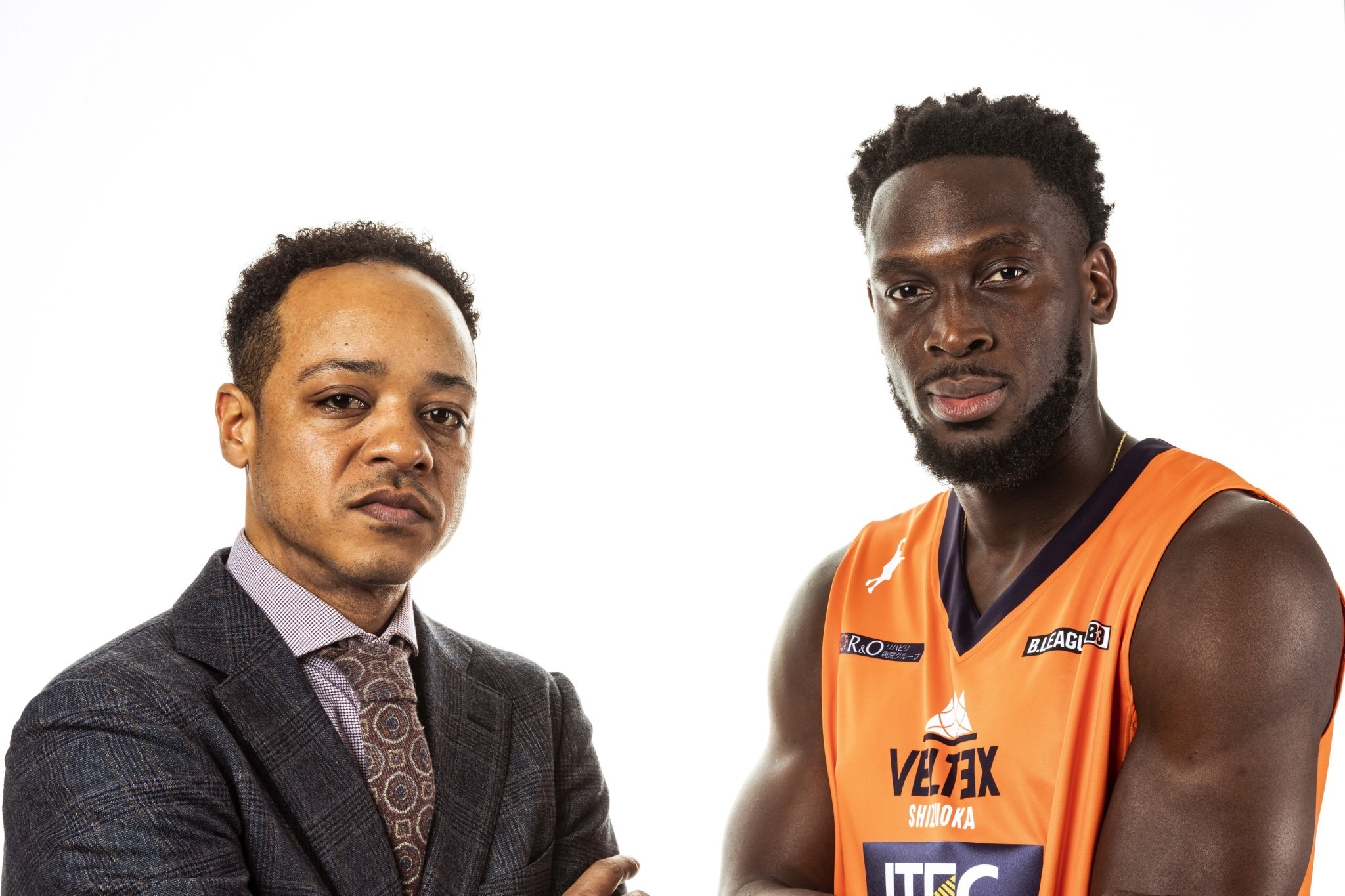
Mike went to Japan to play for his mentor, former NBA coach Rasheed Hazzard. (Courtesy of Mike Ojo)
When I signed, Japan's league was still going and there was no indication that it was gonna stop. But with the signing and negotiation process, things ended up getting dragged out.
The first weekend I was out here, in late February, I wasn't eligible to play. I wouldn't have been able to because, after a 17-hour flight with a crazy time difference, playing basketball is not something your body's gonna allow you to do. So I got to see a game. And then, we were going through practice and everything, ramping up to play a back-to-back the following weekend, and it was at that point that they said they were going to be postponing the games because of the coronavirus.
Initially, they told us they're just gonna postpone the games for two weeks. From two weeks, it became a month. And then from a month, it became indefinite. So we went into training camp mode because we didn't know how we were gonna proceed. When the league is gonna shut down, but there's still the potential of the league not shutting down, you obviously don't want to not be ready to play. We just practiced, practiced, practiced. It was cool to meet new people and play in a different environment. But it's been frustrating not being able to actually play due to circumstances that are completely out of everybody's control.
In late March, the Japanese league tried to restart. They had a few games, but there were rumors that some players had contracted the virus. Naturally, people were worried about that. They were proposing having games without fans and taking all the similar steps that the NBA was taking to potentially continue games, but it just didn't make sense. I think things just got too bad, so they decided to scrap the season altogether.
Obviously, as a basketball player, I want to play basketball. But reading the writing on the wall, and how the dates were pushed back and then with the Olympics being postponed, it was inevitable to me that the rest of the season in Japan would get canceled. I think it's the right decision because basketball is just a game, whereas with what the world is facing right now, it's a life issue. I can go shoot a basketball next year. I can shoot a basketball the next 30 years. But I'm not necessarily guaranteed to live. And if I knew that I was at a sporting event that led to an outbreak in any country, I don't know if I would be able to live with myself. Just knowing that I've essentially inflicted pain upon people when, as an athlete, I'm an entertainer, it just doesn't match up for me.
It's crazy because my family and friends were so worried. Everyone's, like, Oh, don't catch anything. On the flight over here, I disinfected the whole area I was sitting in, traveled with a mask, the whole nine. And now, to have the tables turned, it's a crazy feeling because, obviously, I’m worried. Being from Los Angeles, a huge city, it's only a matter of time until those hospitals end up getting overwhelmed, which is very sad. I have a few friends who work within the healthcare system, and I've been communicating with them to make sure that, from a mental standpoint, they're okay because they're on the frontlines of this. They were worried about me coming out here and now the tables have completely turned.
In Shizuoka, we're not under lockdown. We're not under quarantine. We're pretty much living a normal life.
Naturally, the Japanese people are hyper germ-conscious. There are a lot of things they do that American cities should try and follow.
There's hand sanitizer everywhere. People walk around with masks on. We don't wear shoes inside. In certain buildings, we have to take our shoes off and either walk around in our socks or put a different pair of shoes on, so there's no outside dirt coming into buildings.
Even in practices, there's sanitizer everywhere. We'll still shake hands, but as soon as we shake hands, we'll get the hand sanitizer out. We get our temperatures checked before practice. They're trying to make sure that we don't get sick in any way, shape or form.

Mike arrived in Shizuoka just before the Japanese league shut down due to the coronavirus. (Courtesy of Mike Ojo)
This organization here has been wonderful in the way that they've treated and accommodated us. Our team owner owns three hospitals. So from a healthcare standpoint, they've been nothing short of amazing with the way they've provided for us, as far as the general maintenance stuff that you would go through as an athlete.
On top of that, healthcare here is free for everybody, which is obviously not the case in America. So just knowing that, there's a sense of comfort because you compare that to back home, where you have people who aren't insured. And now, you're not insured, you don't have healthcare and you're potentially facing contracting a life-threatening virus. The idea of that, it's terrifying. If you're sick and you don't have health insurance, you're not gonna want to go to the hospital because the first thought on your mind is, like, Okay, I'm sick, but am I even going to be able to afford the healthcare that I need?
If the people in need aren't going to be able to actually get treatment and get healthcare, it's ultimately gonna end up affecting everybody else. If you have healthy people who can afford insurance and whatnot, but you have unhealthy people who can't afford it and they're unhealthy just because of luck and chance, at some point, peoples' paths are gonna cross. And these people who have been infected are gonna cross paths with somebody who hasn't. Not having universal healthcare in a country that's as amazing as America is, it just doesn't make sense.
I'm super happy with the way the team has accommodated us. Knowing that they work in the healthcare industry provides me with a different level of comfort because if, in some worst-case scenario, I was to get sick or anything was to happen to me, I know the team has the facilities to help me get through it.
They've taken a lot of steps to try and prevent the spread of germs and disease out here. I think that's based on their experiences with prior things, like SARS. They definitely learned lessons from those things.
Whereas, in America, I feel like we were insulated from those problems, at least on a large scale. So we wouldn't necessarily worry as much about them. But it's knocking on America's door (it's kicked the door in), so these problems are now a reality.
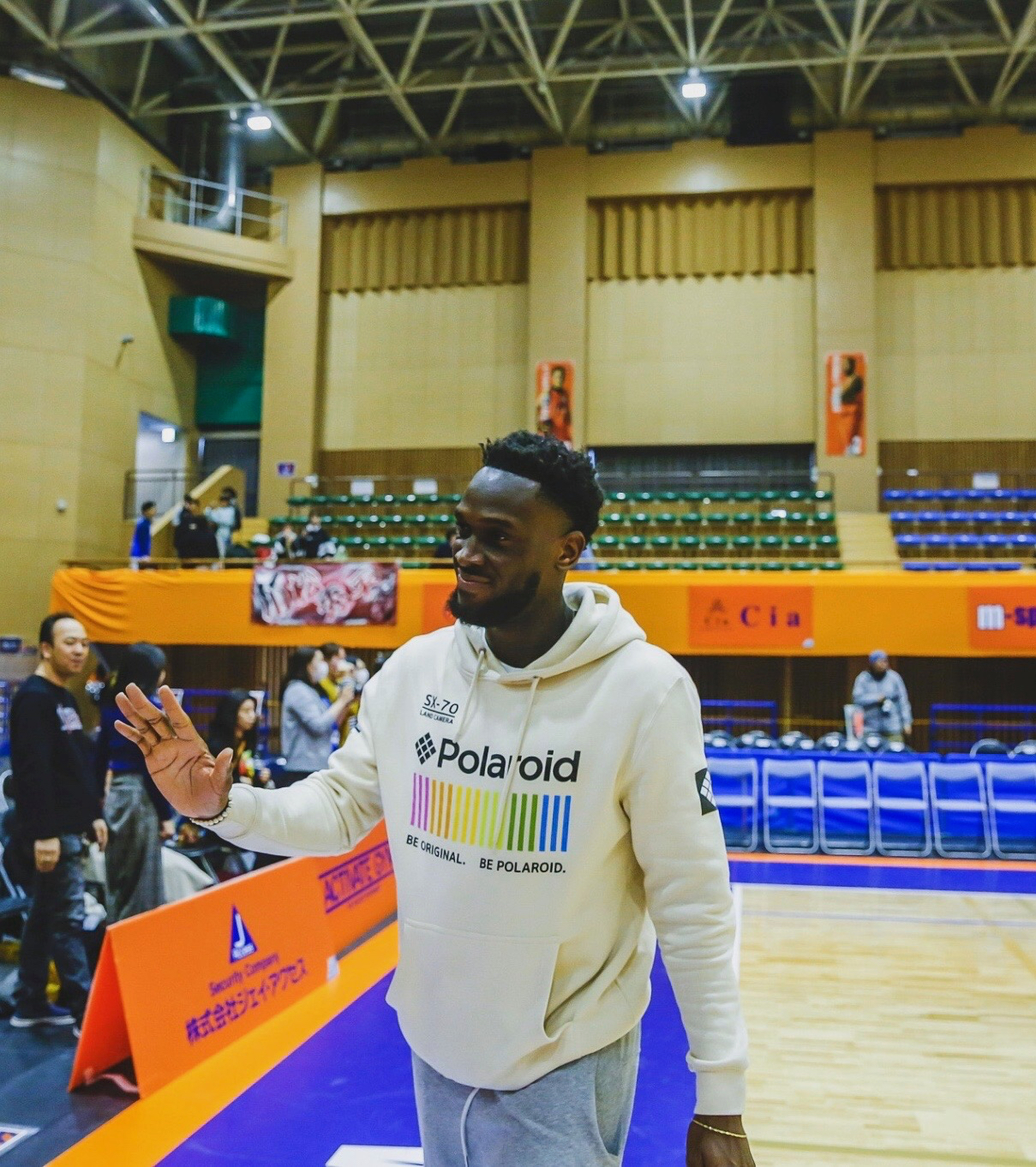
Despite the Japanese league shutting down, Mike decided to stay in Shizuoka rather than return home to LA. (Courtesy of Mike Ojo)
Nowadays, Miye and I talk about once a week. The passing of Kobe Bryant put everything in perspective, as far as communicating with the people that you really love and care for. It hit both of us in the same way where it's, let's just communicate more with the people we really value.
Miye is happy to be healthy, above everything else. He's in good spirits. I've been checking up on him and the family to make sure everyone is okay. Health is the one thing that you can't get back. If you lose your health or something really happens to you, there's no coming back from that.
As basketball players, obviously we want to play games. We miss playing. We want to make money and all that. But there's more money to be made later in life. Right now, the priority is making sure we all stay healthy.
I've kept Miye up to speed with what's going on out here. With the NBA setting the tone for the world in basketball, it was almost a no-brainer. There's no way we were gonna keep playing because—I hate to say this—basketball is just not that important right now. Nike had a slogan: Basketball Never Stops. But basketball has stopped. It's not important like that right now.
With the NBA potentially returning, so much of it depends on the condition of the country. You have about 450 players and I don't know how many staff members you have with each team. But there are a lot of moving parts and variables that you have to contain and insulate from potential exposure to this virus. That poses a lot of challenges.
I think as things ease up, as far as the numbers, it will be more reasonable for discussions to be held. But right now, I think media people saying they want guys to be playing because the country needs sport, the country needs this, the country needs that...like, the country doesn't need sport right now. The country needs to unify and to find a way to actually self-quarantine to stop the spread of this.
But as far as contingency stuff, hypothetically, if you could find a remote location to house all essential staff, all players and whatnot, you could potentially do things like that. In China, that's what they were planning on doing, having two arenas and having everybody stay within one area. On paper, it sounds good but, again, it only takes one person to not listen, to potentially get exposed and then, if anything, the kind of close quarters that you thought would insulate you from the virus could end up hurting you. At this point, the risk is not necessarily worth the reward.
For myself in Japan, there are good things to come. I feel like I've fallen into a good situation and the timing is actually in my favor. I'm gonna continue to show what I can, be who I am as a player and feel like good things will come from that.
As far as Miye with the Jazz, I think he's in a really good spot. In the short term, things will be a little bit tough just because he's on a veteran team—and a very good veteran team, at that. But in the long run, which is really what it's about for him, I think he'll be great. He's gonna, in my opinion, ultimately become a contributor. His combination of humbleness, hunger and work ethic, it's really hard to come by. I think he should be good for years to come. I just hope he gets his opportunity to shine sooner than later. But I know whenever he does get it, he's gonna take it and run with it.
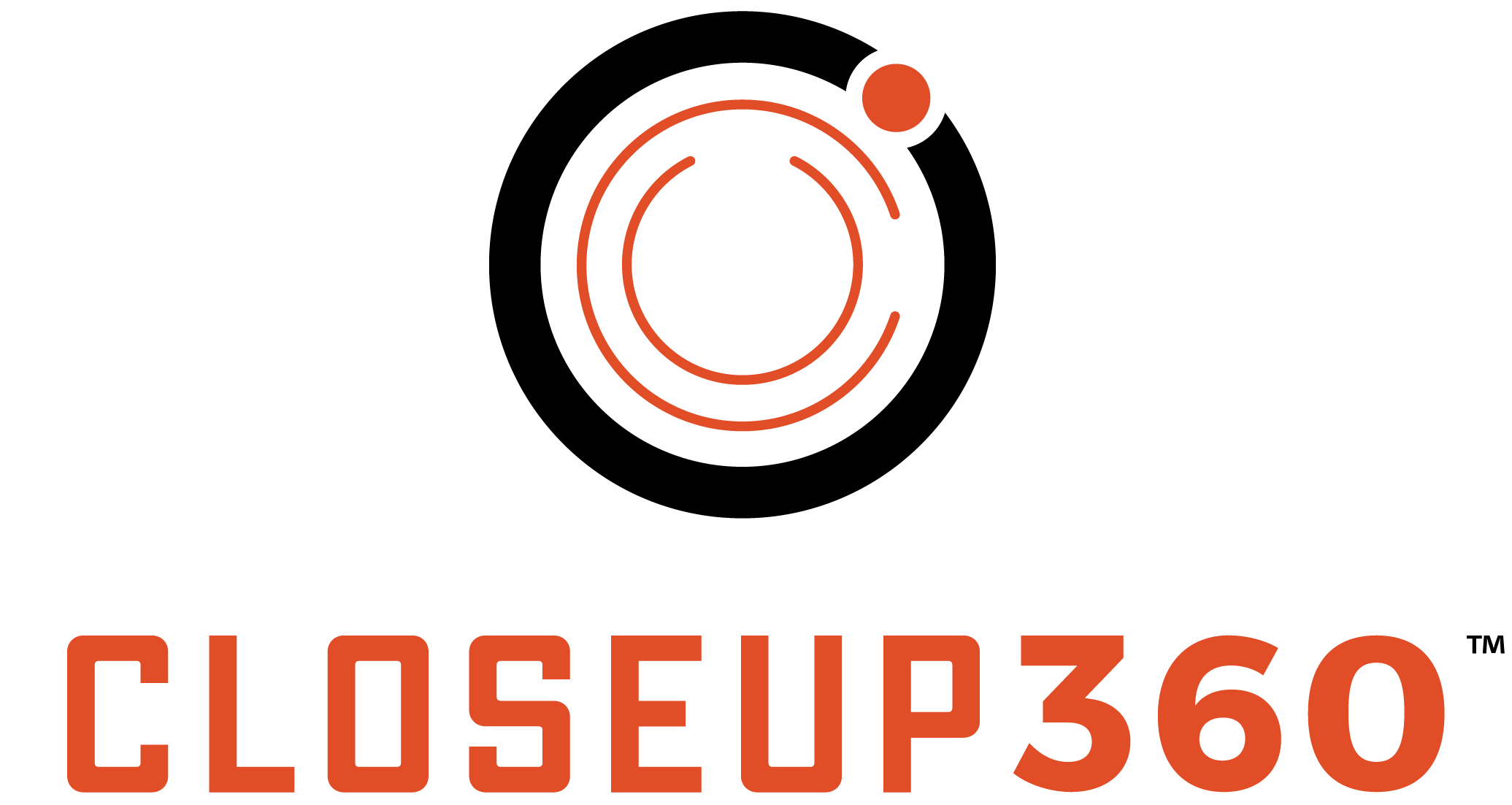
Instagram
Twitter
Error: Could not authenticate you.
Facebook
Subscribe